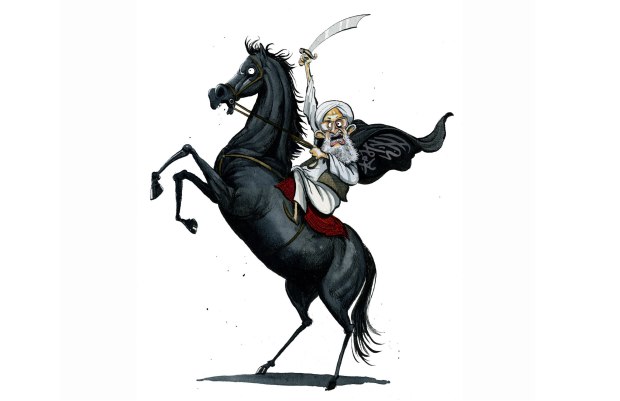Paris has banned e-scooters after the people were asked to vote in a referendum. Not many of the capital’s 1.38 million registered citizens bothered to cast their ballot on Sunday, but of the 103,000 who did 90 per cent voted against.
The Mayor of Paris, Anne Hidalgo hailed the referendum as a red letter day for ‘participative democracy’ over ‘democracy of public opinion and polls’. The city’s three e-scooter operators – Dott, Lime and Tier – quickly cried foul, citing what they described as ‘very restrictive voting methods’; only 21 voting stations were open, and there was no internet voting.
Often derided as the ‘president of the rich’, Macron could also lay claim to being ‘president of the retired’
‘This led to an extremely low turnout, heavily skewed towards older age groups, which has widened the gap between pros and cons,’ said the operators. ‘The result of this vote will have a direct impact on the travel of 400,000 people per month, 71 per cent of whom are 18-35 year old residents.’
The photographs of Parisians queuing at stations suggest it was indeed senior citizens who decided the outcome of the referendum. Several told journalists outside the voting stations that they wanted the 15,000 scooters banned because they were dangerous and frightening. There were 408 accidents involving e-scooters in Paris in 2022.
The e-scooter companies had tried to galvanise their users to vote in the referendum, exploiting social media influences to raise awareness of what was at stake. It was part of a two-week campaign that included a website and campaigning at universities. Fat lot of good it did them. As Le Figaro put it, because of this apathy the ‘Boomers can impose their choice’.
In a sense the e-scooter result reflects last year’s presidential election. In the first round of voting, Jean-Luc Melenchon scored best of any of the twelve candidates among the 18-24 demographic; Marine Le Pen topped both the 25-34 and the 35-49 age groups, and she lost by just one point to Emmanuel Macron in the 50-64 range.
It was among the over-65s where Macron romped to victory (turnout was strongest among this age group), scoring 37 per cent, 19 more than Le Pen and 16 better than Melenchon. That meant Macron topped the first round with 9.7 million votes, with Le Pen on 8.1 million and Melenchon on 7.7 million.
In the second round run off with Le Pen, 71 per cent of the over-70s voted for Macron. Often derided by his enemies as the ‘president of the rich’, he could also lay claim to being ‘president of the retired’.
France’s ageing population has been much in the news lately because of the pension reform protests. ‘When I entered working life there were 10 million retirees,’ said Macron in a television interview last month, justifying his decision to raise the age of retirement from 62 to 64. ‘Today there are 17 million. In the 2030s, there will be 20 million.’
For once, not even the president’s fiercest critics could question the veracity of his words. Twenty six per cent of France’s population is over 60, a figure that will rise to nearly one in three by 2040. In a recent article, Le Monde said this greying of the population raises three major issues: the surge in dependency, labour shortages and stagnant savings.
Alain Villemeur, the scientific director of a think tank that studies the effects of aging and longevity on French society, told the newspaper that ‘the major challenge is dependency’. He forecast that the cost of caring for dependent elderly will hit nearly €31 billion (£27.2 billion) by 2040, while simultaneously the diminishing birth rate will result in a decrease in the working population. However, according to the think-tank, ‘between half and three-quarters of the pure effect of ageing should be addressed by past pension reforms’.
It’s not just dependency that will be a significant challenge for France in the coming decades as a result of its ageing population. So will democracy. One might have hoped that after last year’s presidential election, the under-35s would have understood that they need to get off their derrières and vote if they want a greater say in society.
But with the demographics going the way they are, even if a decade from now voter turnout among the under-35s has improved significantly, there will be more elderly voters. Divergences among the young and the elderly on economic, social, cultural and environmental issues will grow; political parties will increasingly prioritise their policies for the demographic that gives them the best chance of victory: the elderly.
Therein lies danger. Already there is a growing minority of French youth who are disaffected with the political process; they’ve been voicing their anger passively and violently in recent weeks. This anger and frustration will deepen if they feel that their vote is meaningless because they demographically outnumbered.
‘It’s hard being 20 in 2020’, said Macron in October that year, shortly before he plunged France into another lockdown, a policy that was designed for the satisfaction of his elderly voters. It probably won’t be much fun being 20 in 2040 when France will be even more of a gerontocracy than it is now.
Got something to add? Join the discussion and comment below.
Get 10 issues for just $10
Subscribe to The Spectator Australia today for the next 10 magazine issues, plus full online access, for just $10.





















Comments
Don't miss out
Join the conversation with other Spectator Australia readers. Subscribe to leave a comment.
SUBSCRIBEAlready a subscriber? Log in